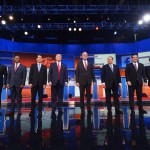Here are two news stories from Fortune: The first one on the US having issues with China and its "protectionists" policies and that US wants it to "open" up the economy more…
But if China, which manages the yuan against an unknown basket of currencies, thinks it can fob off its critics this way, it has mightily underestimated Congress in an election year. To judge by the host of bills and amendments aimed at curbing trade with China that are floating around Capitol Hill, there is a hearty appetite for China-bashing in Congress. And lawmakers may soon get the green light they need to pass a protectionist bill: In its semiannual report on foreign exchange, due out in mid-April, the U.S. Treasury may be forced to brand China a currency manipulator unless there has been a meaningful move in the yuan.
…. and second one..that argues that Free Trade Agreements are BAD for business!! If the US and the Europe go on selectively using economic policies… touting when they want and trashing when the other guy beats the heck out of their competition.. then very soon China may look more Capitalist than these jokers! Seriously, US and Europe is heading the Socialist/Communist path.. if they would carefully look at it!
The WTO on March 22 issued a report criticizing the U.S. pursuit of free trade agreements. The report claims that U.S. free trade agreements create political interests in other countries, which complicate the multilateral process. A large number of free trade agreements (FTAs) have been negotiated over the past few years. One argument in favor of FTAs is that echoed by U.S. Trade Representative Rob Portman in his reply to WTO criticism: They provide continued momentum to the trade liberalization process in the absence of progress at the multilateral level. However, many FTAs include broader foreign policy aims, with little substantive trade liberalization content. Indeed, they can have a damaging effect on global economic efficiency in that they fragment markets as much as national commercial policies did in the past. The result is trade diversion rather than trade creation. Despite this, many countries have only a few critical trading partners, and expect agreements with these partners to provide a framework for further trade growth. Political and strategic considerations further narrow the selection of negotiating partners. This approach essentially seeks to entrench existing trade patterns and thus helps service existing relationships.
Tags: capitalism, free trade policy, US, China














